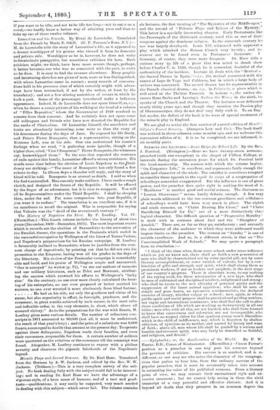The History of Napoleon the First. By P. Lanfrey. Vol.
W. (Macmillan.)—This fourth volume includes the history of about two years (December, 1809—December, 1811). The most important events which it records are the election of Bernardotte to the succession of the Swedish throne, the operations in the Peninsula which ended in the successful occupation by Wellington of the Lines of Torres Vedras, and Napoleon's preparations for his Russian campaign. M. Lanfrey is favourably inclined to Bernadotte, whom he justifies from the com- mon charge of ingratitude, by pointing out that he did not owe his promotion to the Emperor, having won all his grades in the days of the Directory. His review of the Peninsular campaign is remarkably able and lucid, and his praise of Wellington ample and unreserved. "One is annoyed" he writes (p. 71), "to see our authors of memoirs and our military historians, such as Pelet and Marmot* attribut- ing the success which crowned his efforts to Wellington's ' lucky star.' On the contrary, no one ever more closely calculated the bear- ing of his enterprises, no one ever prepared or better merited his success, no one ever wrested it more obstinately from blind fortune.
. . . He had on his side, not only the goodness and virtue of his cause, but also superiority in effort, in foresight, prudence, and dis- cernment, in great results achieved by such means, in the most calm and inflexible order, in the very elements, in short, which above• all ensured victory." As to the preparations for the war with Russia, M. Lanfrey gives some curious details. The number of refractory con- scripts in 1811 amounted to 80,000 (not all, it must be understood, the result of that year's levy) ; and the price of a substitute was 8,000 francs, a sum equal to double that amount at the present day. To operate against these delinquents, Napoleon made their families, and even their communes, responsible for them. A certain number of soldiers were quartered on the relatives or the commune till the conscript was found. Altogether, M. Lanfrey continues to expose with a pitiless severity and clearness the gigantic falsehoods of the Napoleonic legend.


































 Previous page
Previous page